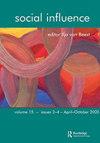A novel way of responding to dissonance evoked by belief disconfirmation: making the wrongdoing of an opponent salient
IF 0.6
3区 心理学
Q3 PSYCHOLOGY, SOCIAL
引用次数: 3
Abstract
ABSTRACT Based on dissonance theory, we predicted that individuals who supported a political figure (Donald Trump), were exposed to information about his wrongdoings, and believed the veracity of this information would be most likely to share social media that points to incidents in which opponents also engaged in wrongdoing. Participants (N = 409) varying in their support for Trump were exposed to information concerning his alleged wrongdoings (or a neutral article). They viewed a meme of a political rival (Hilary Clinton) that alluded to her alleged wrongdoings, and reported how likely they would be to share the meme (and indicated how accurate they believed the Trump article was). Results supported the prediction, suggesting that dissonance may cause individuals to emphasize the wrongdoings of opponents.一种对信念不确认引起的失调反应的新方法:使对手的错误突出
基于认知失调理论,我们预测那些支持某一政治人物(唐纳德·特朗普)的人在接触到有关其不法行为的信息后,相信这些信息的真实性的人最有可能在社交媒体上分享指出对手也有不法行为的事件。对特朗普支持程度不同的参与者(N = 409)接触到有关他所谓的不法行为的信息(或一篇中立的文章)。他们看了一个政治对手(希拉里·克林顿)的表情包,其中暗指她所谓的不法行为,然后报告了他们分享这个表情包的可能性(并表明他们认为特朗普的文章有多准确)。结果支持了这一预测,表明不和谐可能导致个体强调对手的错误行为。
本文章由计算机程序翻译,如有差异,请以英文原文为准。
求助全文
约1分钟内获得全文
求助全文
来源期刊

Social Influence
PSYCHOLOGY, SOCIAL-
CiteScore
1.50
自引率
0.00%
发文量
4
期刊介绍:
Social Influence is a journal that provides an integrated focus for research into this important, dynamic, and multi-disciplinary field. Topics covered include: conformity, norms, social influence tactics such as norm of reciprocity, authority, scarcity, interpersonal influence, persuasion, power, advertising, mass media effects, political persuasion, propaganda, comparative influence, compliance, minority influence, influence in groups, cultic influence, social movements, social contagions, rumors, resistance to influence, influence across cultures, and the history of influence research.
 求助内容:
求助内容: 应助结果提醒方式:
应助结果提醒方式:


